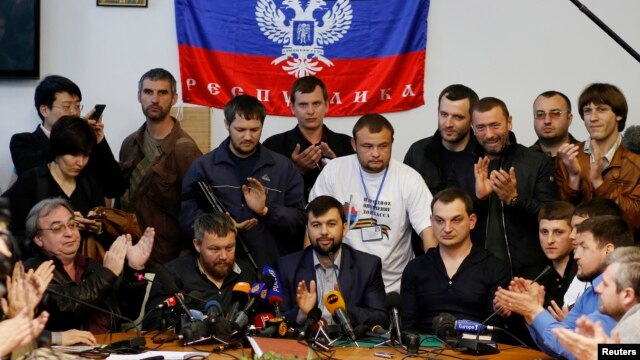
FILE - Pro-Russian separatist leader Denis Pushilin (C) talks during a media conference inside a regional government building in Donetsk, eastern Ukraine, May 8, 2014.
Following a controversial referendum on self-rule, Ukraine’s separatist region of Donetsk has appealed to Moscow on Monday to consider its absorbtion into the Russian Federation to “restore historic justice.”
The call was made by Denis Pushilin, a leading member of the self-declared “Donetsk People's Republic,” at a news conference in Donetsk.
Based on the will of the people and on the restoration of a historic justice, we ask the Russian Federation to consider the absorbtion of the Donetsk People's Republic into the Russian Federation,” he said.
The people of Donetsk have always been part of the Russian world. For us, the history of Russia is our history,” said Pushilin.
His call follows Sunday’s Crimea-style referendums in Ukraine eastern Donetsk and Luhansk regions, in which separatists claimed more that 90 percent support for self-rule.
Russia annexed Ukraine’s Crimea region after a similar poll in March.
The results of the Donetsk and Luhansk votes should be implemented peacefully, Russia said earlier, without saying what further action it might take.
Polls denounced
Ukraine's acting president, Oleksandr Turchynov, has slammed the rebel-held referendums as a "propaganda farce without any legal basis."
However, he added that he wanted to "continue dialogue with those in the east of Ukraine who have no blood on their hands and who are ready to defend their goals in a legitimate way."
The U.S. has denounced the polls as a "illegal under Ukrainian law" saying it will not recognize their results. A State Department statement said they "violate international law and the territorial integrity of Ukraine."
The European Union has also condemned the votes as illegal. European Union foreign ministers added two Crimean companies and 13 people to the bloc's sanctions list, EU diplomats said. These are in addition to 48 Russians and Ukrainians who have already been targeted with EU asset freezes and visa bans.
The EU ministers also hinted on Monday that any disruption of elections in Ukraine on May 25 could trigger new economic sanctions against Russia.
But the EU remains far behind the United States in the severity of the sanctions it has imposed on Russia. Some European governments fear tough trade sanctions on Russia could undermine their own economies, just recovering from the financial crisis, and provoke Russian retaliation.
Coup accusations
Turchynov also accused Russia of working to overthrow legitimate state authorities in Ukraine on Monday after pro-Russian rebels declared a resounding victory in referendums in Ukraine’s Donetsk and Luhansk regions.
Turchynov said the Kremlin was trying to disrupt a presidential election scheduled for May 25 which is taking center stage in a confrontation pitting Moscow along with pro-Russia separatists in eastern Ukraine against the government in Kyiv and its Western backers.
Ukraine's May 25 election is intended to secure democratic continuity and legitimacy after pro-Moscow president Viktor Yanukovych fled the country in February, and Western governments have threatened more sanctions in the vital areas of energy, financial services and engineering if Moscow disrupts the vote.
Separatists to form own army
Following Sunday's referendums, separatist leaders in Donetsk say they will form their own army and expect all forces affiliated with Kyiv to leave the region.
Ukraine’s government is already struggling with its anti-separatist military campaign and is reported to be short on men. Analysts say they fear the authorities are likely to rely on irregulars more and that the fighting could spread beyond the regions of Donetsk and Luhansk, which voted Sunday.
Luhansk separatist leader Valery Bolotov said now that the plebiscites are over, his pro-Russian militiamen as well as separatists from Donetsk will start turning their attention elsewhere to help other regions agitate for a break from Ukraine.
He said separatists will not enter into any talks with Kyiv and that the only negotiations currently are about prisoner and hostage exchanges.
TV wars
Russian Foreign Minister Sergei Lavrov urged Western ambassadors on Monday to base the reports they write for their countries about the crisis in Ukraine on what they see on Russian television.
Lavrov accused Ukraine of blocking Russian television broadcasts onto its territory and, echoing charges by Kyiv about Moscow, said the fellow former Soviet republic's media were broadcasting lies about the crisis.
They are trying to set up an information blockade and, with unbiased information closed off to viewers and radio listeners, run completely shameless lies,” Lavrov told a news conference.
“The ambassadors in Moscow obviously see what Russian TV is showing in live broadcasts and I am sure they are obliged to report to their capitals the facts they see live. Otherwise they would be doing a totally unprofessional job,” said Lavrov.
Russian media, most under direct or indirect government control, are widely viewed in the West as distorting news about events in Ukraine both for internal and external consumption.
|
|
